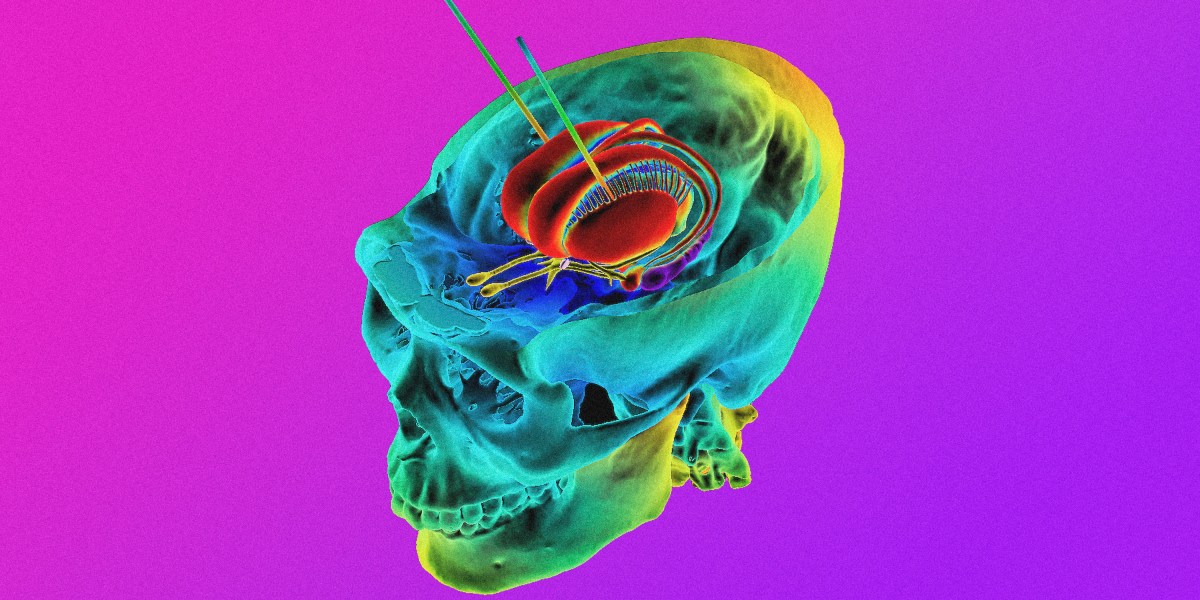This week’s newsletter is coming to you from Lisbon, Portugal. It’s a nice change of scene from chilly London. The sun is shining, the sky is bright blue, and the Tagus River is positively gleaming. My hotel is about a 15-minute walk from the area’s best-known purveyor of the crisp and creamy little custard tarts Portugal is famous for. But that’s just a coincidence. Honest.
I’m here for a scientific conference on brain stimulation. Neuroscientists, brain surgeons, psychiatrists, and ethicists have come together to discuss the latest in technologies that use magnetic or electrical pulses to change the way our brains work.
Some of these tools work by passing a device over a person’s head. Others involve cutting into people’s skulls to stick needle-like electrodes deep into the brain. And there are plenty of approaches that lie somewhere in between these extremes. We’re still getting to grips with how they work, and how we can best use them. In the meantime, some are generating huge amounts of data about individuals’ brains. And there’s a chance this data could be used against them in a court of law.
We already know that brain stimulation can help some people with Parkinson’s disease and depression that doesn’t respond to medication. But the scientists here at this conference are pushing the boundaries. They’re exploring brain stimulation for obsessive-compulsive disorder, alcohol and substance-use disorders, stroke recovery, and even long covid. Others are working on ways to enhance the way healthy brains work, whether by improving our memory or helping us become more alert or better at math.
Since I arrived at the conference on Monday, I’ve gathered the impression that brain stimulation is well and truly taking off, and that we’re poised to see at least some forms become more mainstream in medicine over the coming years.
We’ve covered some of the key advances in recent Tech Review articles. One is the ability to record and analyze reams of data from people’s brains. This was technically impossible even in the recent past. Today, it is quite routine for people with severe or otherwise untreatable epilepsy to have electrodes implanted in their brains for a week or more. This allows doctors to figure out where in the brain their seizures start, so surgeons can cut out that bit of brain tissue and stop the seizures.
These days neuroscientists can also use AI-based tools to help make sense of the rest of the data that is collected. This might help us understand what the brain is doing when we’re resting, chatting, or eating, for example. I recently wrote about one team that learned from this kind of data that the brain seems to cycle between periods of relative stability and chaos.
Implanting electrodes into the brain can also help us understand other disorders. Take depression, for example. Multiple research teams are investigating whether deep brain stimulation can help people with severe symptoms that can’t be treated with typical antidepressants, or even with last-resort options like electroconvulsive therapy.
The most cutting-edge approaches involve what are known as “closed loop” devices. These are designed to record what is happening in the brain and then deliver a jolt of electricity only when it seems the person might be about to take a turn for the worse.
There is also a move toward remote brain stimulation—treatments that can be delivered to people at home, while their brain recordings are sent to a doctor’s office. Both approaches involve collecting, storing, and sharing brain data, which might reveal the state of the brain at any given time and hint at what the person is doing or feeling at that moment.
“Is this a problem?” Jennifer Chandler, who studies legal, ethical, and policy issues in neuroscience at the University of Ottawa in Canada, asked the audience. “It depends how it will be used.”
Chandler highlighted the case of Ross Compton, a man whose own heart data was used against him when he was accused of burning down his home in Ohio in 2016. Compton claimed that he woke in the middle of the night to find his house on fire, hastily grabbed a few belongings, broke a window, and made his escape.
But after the authorities found traces of gasoline on his clothes and shoes, they issued a search warrant that allowed law enforcement to seize the data collected by his pacemaker. A cardiologist testified that it was very unlikely Compton would have been able to quickly carry items out of his house given the state of his heart health.
Recordings taken from a person’s brain could be used similarly, Chandler cautioned. She recalled how, last summer, someone from a company that makes brain devices told her that law enforcement had asked for recordings taken from an implant inside the brain of a person with epilepsy. That person had been accused of assaulting a police officer but, as the brain data proved, was just having a seizure at the time.
While the data cleared that person, similar readings could as easily be used against someone else. Neural recordings could even suggest, for example, whether a driver involved in a car accident was alert or concentrating on the road.
It’s not clear how these kinds of recordings might be used by the criminal justice system in the future. But given the explosion of research and technical advances we’re seeing in the field, it’s vital that we start thinking about these uses, and how to protect brain data, now.
Read more from Tech Review’s archive
Brain stimulation technologies range from super-invasive (think brain surgeons sticking electrodes into the brain) to noninvasive (magnets passed over the skull). But even noninvasive forms can elicit some kind of change in the brain—and in how we think and feel. So they’re probably more invasive than we might think, as I wrote in a previous edition of The Checkup.
A “memory prosthesis” implant seems to improve memory in people with brain damage, as I wrote in September. The device is designed to mimic the way our brains typically form memories in a seahorse-shaped structure called the hippocampus.
And a noninvasive form of brain stimulation, which delivers gentle pulses of electricity via a swimming cap of electrodes, seems to improve the memory of older people, as I reported last year.
Electrodes implanted in the brains of people with depression are helping us to better understand and treat the disorder. One team has used a set of electrodes to develop a “mood decoder,” designed to tell when a person is entering a depressive state and help reverse it.
It’s not just brain data that could be dangerous in the wrong hands. My colleague Tanya Basu has written a guide to protecting your menstrual health data in a post-Roe world.
From around the web
The World Health Organization has finally published a definition of long covid in children, following a long-running and extremely heated debate among parents, doctors, and scientists. Children and adolescents with “post-covid-19 condition” have symptoms affecting their everyday life for at least two months, typically including fatigue, anxiety, and changes to their sense of smell. The WHO has included a list of other potential symptoms, which include chest pain, fever, nausea, rash, palpitations, and cognitive difficulties. (WHO)
Speaking of long covid, here’s what not to ask someone who’s experiencing lasting symptoms. (The Atlantic)
He Jiankui, the controversial scientist whose work led to the world’s first babies born using CRISPR gene editing, has had his Hong Kong visa revoked. The Hong Kong government made the announcement hours after He claimed he was in contact with universities, companies, and research institutes there. (Associated Press)
A 53-year-old man is considered to be the third person with HIV to be officially cleared of the virus. The man received bone marrow stem cells from a person with a genetic mutation that makes cells resistant to HIV. (Nature)
Your body is electric. Cracking the code of the “electrome” could help us find new ways to understand and treat all kinds of diseases. (New Scientist)















